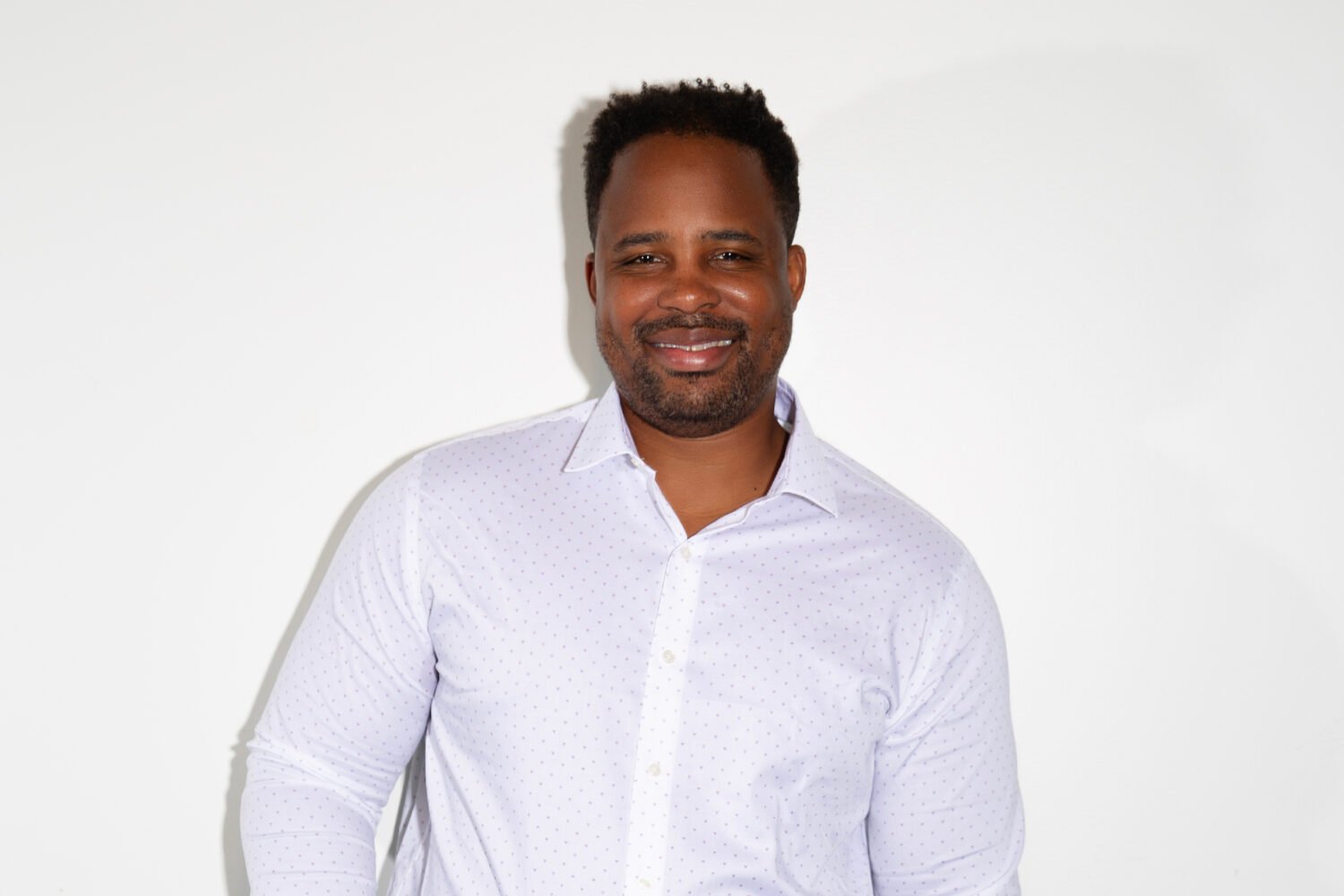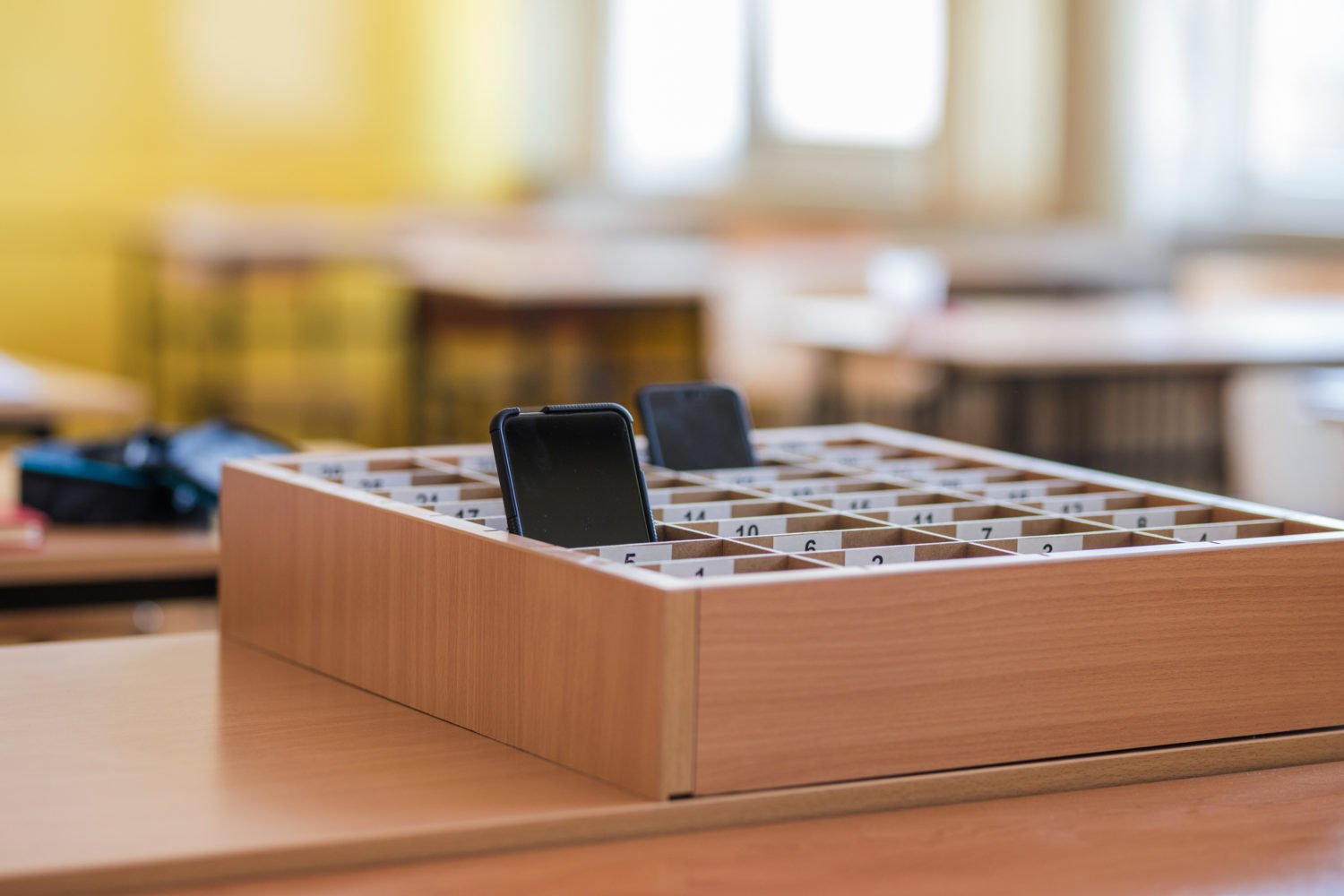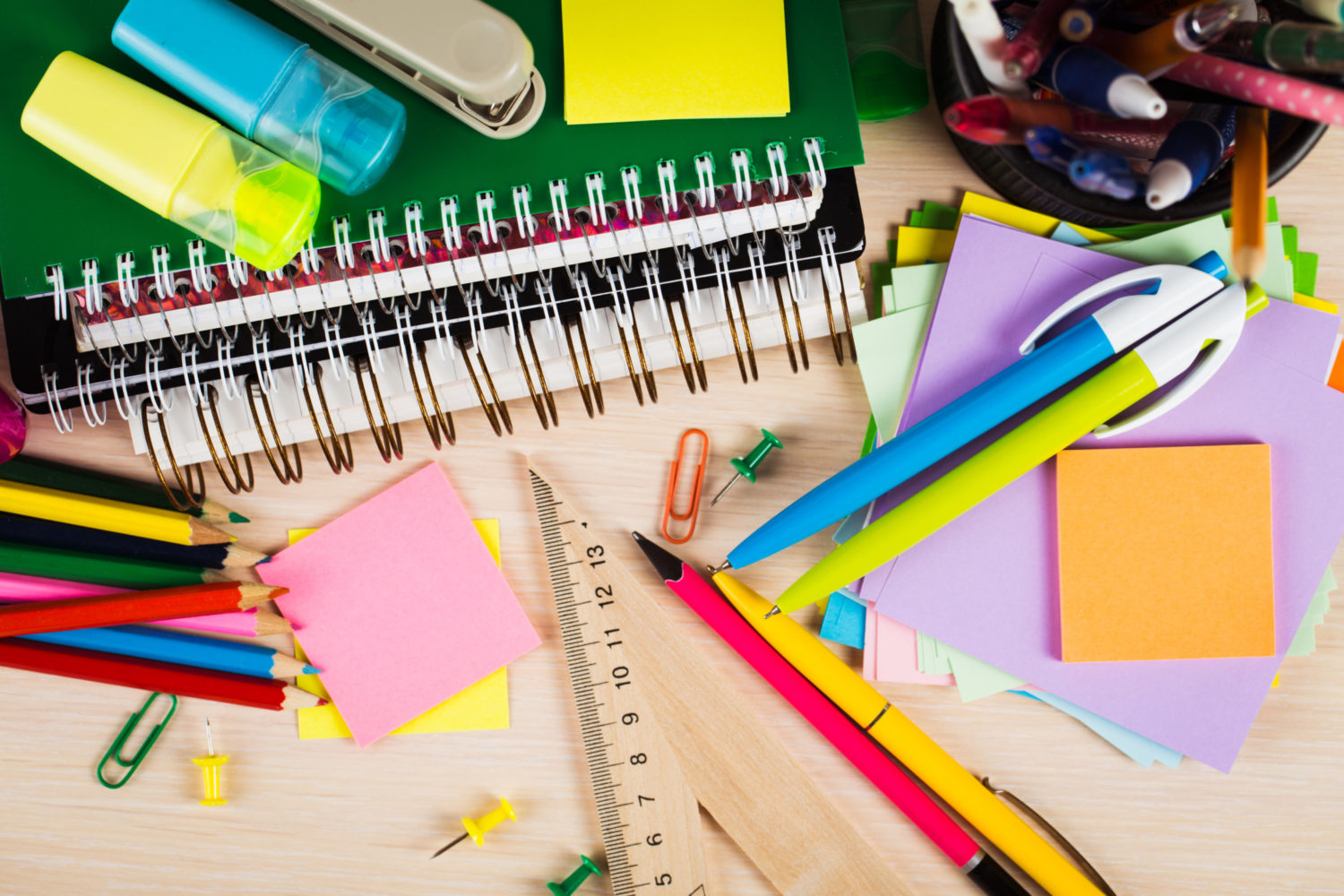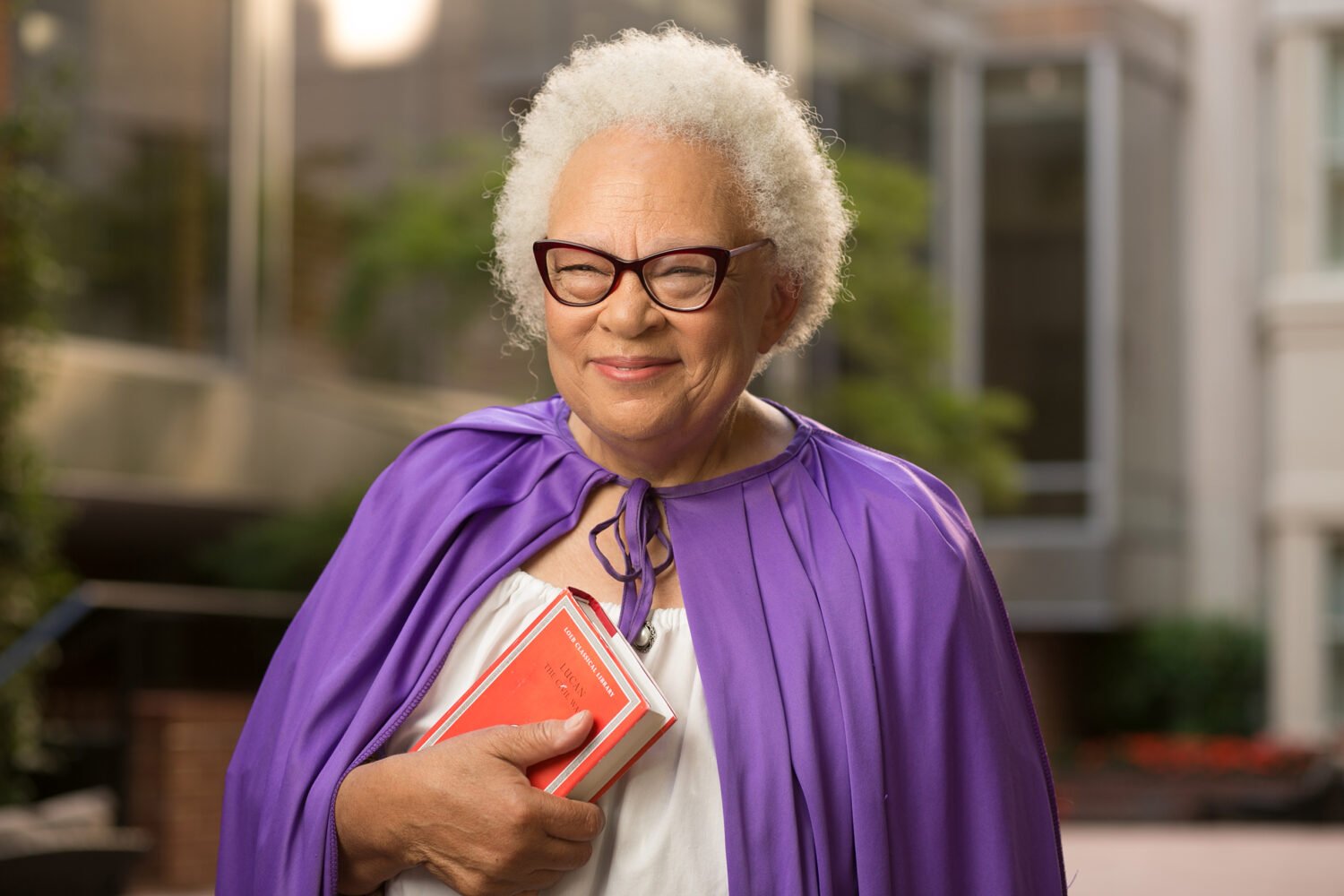Students and teachers are back in class at Arlington Public Schools, but there is one notable absence this year. The district’s school board voted in August to limit student cellphone use—codifying an “off and away” policy across all of its elementary and middle schools, while allowing high schoolers to power up their devices only during non-instructional times, such as during lunch or between classes.
At Wakefield High School, students are participating in a more restrictive pilot program that requires them to place their cellphones in a magnetic Yondr pouch before first period. While the pouches can stay on their person, the phones inside can’t be accessed until the end of the day via magnetic unlocking bases at designated stations.
The pilot program reflects new draft guidelines from the Virginia Department of Education calling for schools to work toward “bell-to-bell” bans on phone access, meaning that devices must be turned off and put away from the first bell at the start of the day until after the dismissal bell, with no exceptions for lunch or passing time. In July, Virginia Governor Glenn Youngkin issued an executive order calling for the establishment of official guidance on how schools across the state should implement cellphone-free education.
Wakefield is the only Arlington high school that’s part of the pilot program, alongside three middle schools. More permanent cellphone use guidelines are expected for the participating schools in December.
Youngkin is hardly the first person to suggest that cellphone use in schools contributes to classroom distraction and student mental health issues. How do the students at Wakefield feel about the new restrictions? Washingtonian sat down with three Wakefield students–plus their principal, Peter Balas–to discuss their experiences so far:
Life before the ban
Brianna Gilbert, a junior, tells Washingtonian that she generally uses her phone “in addendum with all my other stuff.” It’s her alarm clock, her calendar, and where she stores her notes for school. Before the Yondr pouches hit Wakefield, she says, “I used my phone pretty much all the time, every day.” That included having it on her desk during class sometimes, but only while doing independent work—not during lectures, presentations, or if a teacher was giving instructions.
It’s similar to how senior Kindu Okoko says he used his device. It was a way to organize his schoolwork while staying in the loop about his extracurricular activities—”being able to text people and be like, ‘Hey, what’s going on? Are we meeting today?’” he says. However, like Gilbert, Okoko says that when it came time to “buckle down” during class, he’d move his phone from his desk to his backpack.
Gabrielle Harber, a senior, says she often “used my phone more as a break.” She’d answer texts, check email, and sometimes play games, but she says she didn’t struggle snapping back into focus during instructional time.
“It’s not like a prime part of my school day, as it is for some of my other classmates, but I would use it every day,” she says.
A rough start
Harber is still adjusting to not having access to her phone during the day. “I’m not having withdrawals, because that makes me sound like I’m addicted,” she says—but adds that, on the first day of the new policy, some of her classmates “could not handle it.”
“If you have the pouch, it’s a magnet, right? And if you hit it enough, the thought is it’ll pop open,” says Gilbert.
The students recount their first phone-free lunch period: Kids hurling their pouches against the table “sounded like gunshots,” Harber says. In some cases, it worked to free the devices. But at a cost.
Balas chimes in: “We had some shattered phones.”
“In my mind, I was like, ‘Okay, I get it. You want to get it open,'” Harber says. “But you do understand, like, your phone is in the pouch? You would be hurting your phone. There is a kid—he threw it downstairs. And I was like, ‘what’s the thought process behind that?’”
All three students chalk this behavior up to a dependence on technology—one that they say is prevalent among members of Generation Z.
“At this age, these are your formative years,” Okoko says. “You’re finding yourself. You’re trying to find confidence, trying to find your individuality, and your phone is hurting that consistently. Like, there are people who are afraid to just sit by themselves. There are people who are not able to have their own mental checks.”
Okoko turns to Balas: “You better be ready for Generation Alpha, if you think we’re bad.”
The day the music died
One loss that all three students are grieving: The ability to listen to music on their phones during the school day.
Harber finds that music helps her center herself throughout the school day: “I just need that because I’d rather listen to lyrics than what some people say.”
For Gilbert, throwing headphones on helps her focus: “Classrooms are either too loud or too quiet, so it’s like that nice in-between.” Okoko echoed the sentiment, saying that going for a walk and listening to a song is part of his “study process.”
Less is more
In terms of personal development, all three students say they’re happy to be cutting back on their screen time. “I feel like most of my headaches that are caused in school—well, 95% come from the children—but that’s probably from looking at the screen all day,” Harber says.
Beyond their individual phone use, the three students felt a “shift in the atmosphere,” according to Harber. While Gilbert thinks it’s too early to sense any long-term effects, she’s happy that her teachers are excited about the policy: “Their attitudes are great.”
Lunchtime, in particular, feels like a new frontier. “It’s so cute now,” Harber says of how her classmates are socializing during the period. The students are seeing people who previously sat alone join their classmates to eat. They’re noticing new friendships among their peers. And traditions are blossoming: Kids will crowd around a friend’s laptop to watch a show.
In the absence of their phones, students are even taking an interest in the Yondr pouches. A group is planning a meetup to decorate theirs together.
“I think in that aspect, socially, putting the phones in the pouch is a plus,” Harber says.
Making memories
The three students are optimistic that restricting phone use will continue to pay social dividends in the future. “It’s hard to have that connectivity in school when you go to a school this large,” Gilbert says. They also hope the new restrictions will refresh their attention spans.
“If I’m distracted enough I’m wasting my time in school, then I’m not accomplishing as much as I could be like when I’m coming here,” Okoko says.
The trio says that when the policy was first introduced, their peers expressed anxiety about how they’d remember their high school years without their phone cameras. But now that the restrictions are in place, students are finding new ways to document their days. Gilbert has a digital camera in her backpack, and Harber has started bringing her film camera to school. They’re finding that it helps them stay present.
“We don’t live in the moment,” Harber says. “We really don’t, because we always have to have a camera on something to be like, ‘Oh, we lived it.’ But you think of how many generations have passed where they can easily be like, ‘Oh, this is the greatest day of my life, because this happened’—and not all the time did they have something that captured that moment.”
Safety concerns
Across Gen Z, anxiety about school safety is a given. Wakefield’s senior class started elementary school in 2012—the same year that the Sandy Hook shooting killed 20 first-graders and six of their educators. They haven’t known a school environment that didn’t carry the implicit threat of violence.
“If something does happen, if an intruder does come into the school with the intent to to hurt somebody or to hurt people, does the phone and communication, will that be up to par to respond to the situation at hand?” Okoko says.
The three students recall a lockdown that happened three years ago, in response to a school threat that was made on social media. Harber texted her family group chat to keep them abreast of the situation, and her mother comforted her. “The bad thing is, we were all scared because of something that was presented from the phone. But the good thing is, I was more calm because I had my phone,” she says.
While the students hope that phone restrictions will ultimately lessen social media drama and other sources of bad feelings, they worry about some of their peers, who are struggling in the short term to adjust to staying offscreen.
“I think that phones for a lot of teenagers, like our demographic, you see an increase in social anxiety, and you see an increase in depression because people have a dependency on their phones,” Okoko says. “And I mean, if we’re looking at this from a mental health standpoint, when going through addiction, it takes time to like, to really unlearn and unwork those habits.
“It’s going to be difficult on some more than others, but I think that in the long run, it’s something that is needed just from, a societal standpoint. Like, nobody should need to be so reliant on something.”
Taking about their generation
Zoomers sometimes feel criticized by older generations for being unable to live without their phones. Okoko says that’s because they’ve never had to: the first iPhone came out in 2007, the year most members of his graduating class were born.
“I think what’s so different about us is we’ve grown up with it,” he says. “We didn’t have a great big switch, because it’s just like, when we got to that age, it was like, ‘Here’s the phone.’”
Outside of the classroom, all three students still think cellphones are a useful tool for learning. “If you’re exposed to all of this information at a younger age, you have to pick up on critical thinking skills,” Okoko says. “Otherwise, you’re gonna fall for anything, and I think that people have not and don’t know how to navigate—shout out, Boomers.”
Harber wants older people to know that her generation does take education seriously, despite stereotypes that technology has completely fried their attention spans and left them unable to form original thoughts. Research showing that Gen Z is the most politically progressive generation yet is more than just a statistic—to her, it’s proof of a reality that she and her friends live every day as they reckon with their coming of age. “Your time is almost up. Mine is just starting.”
The time has come for a TikTok reference. Gilbert laughs: “Do you know you have 30 minutes?”

















